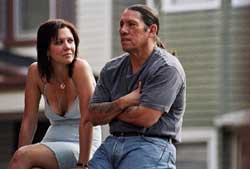Sherrybaby Review
By Jesse Hassenger

Yes, Charlize Theron uglied herself up for Monster and Halle Berry went working-class for Monster's Ball. But Sherrybaby isn't Monster Mommy; it's a quiet, painful little portrait with little of the inherent sympathy (or showier ugliness) of those other roles. More to the point, while Theron and Berry rocked the Oscar-friendly reverse-makeover, Gyllenhaal looks more or less as she usually does: moony face, sad eyes, feathery voice. The only physical transformation involves a blond dye-job, trashy heels, and a lot more screen time for her breasts.
Yet this is all Gyllenhaal and her extraordinary talent require; she is utterly believable as the damaged and near-destitute Sherry, with her standoffish walk and childlike nervous energy, just as convincing as when she plays a polished Manhattanite (The Great New Wonderful, Trust the Man) or a middle-class housewife (World Trade Center). Interesting that so many of her characters, including Sherry, revolve around New York or New Jersey; it's as if Gyllenhaal's offbeat loveliness is the key to an entire metro area (or at least the white-girl portions of one).
And yet Sherrybaby itself left me thinking more about Gyllenhaal's talent than the movie it was serving. Maybe it's the release-date proximity of Down to the Bone, last year's addict-mother indie drama that resembles Sherrybaby not only in its starkness, but in its star: Bone's Vera Farmiga could pass for Gyllenhaal's hardened older sister. Maybe this territory is just too familiar altogether: the poverty, the bad sex, the temptation to relapse, the few comforting faces among dozens who just don't get it or just don't understand.
Sherrybaby is certainly unblinking in its depiction of motherhood; watching Sherry pine for Alexis, fussing over her during visits -- the child is cared for by Sherry's brother and his wife (Brad William Henke and Bridget Barkan) -- often to the point of smothering, makes for an uneasy counterpoint to all of those Hollywood thrillers where a steely mother (usually played by Jodie Foster) will stop at absolutely nothing to protect her child. Little Ryan Simpkins has apparently been isolated from all actressy affects, because she gives as natural a child performance as you're likely to see.
All of the performances, really, are fine in this movie, including Danny Trejo, moving beyond his usual range of grizzled criminals to play a gentle fellow addict, more successful at kicking his habit and nudging -- not pushing -- Sherry in the right direction. But I'm not sure what writer-director Laurie Collyer's point is. As far as I can tell, her movie is realistic, and Sherry's struggles have kind of a horrifically compelling quality; you want her to succeed, or even survive, though for most people she will probably inspire more pity than empathy. What's missing is a fleshed-out character or relationship (not just smart but thin counterpoints) to make this more than a performance piece. Gyllenhaal's work is as strong as a lot of bona fide Oscar bait, not to mention less showy. Unfortunately, the movie around her stands at a respectful distance -- not from her, specifically, but from a unique point of view.
Is it Take Your Daughter to Work Day already?

Facts and Figures
Year: 2006
Run time: 96 mins
In Theaters: Friday 9th February 2007
Box Office Worldwide: $622.8 thousand
Budget: $2M
Production compaines: Red Envelope Entertainment
Reviews
Contactmusic.com: 3 / 5
IMDB: 6.7 / 10
Cast & Crew
Director: Laurie Collyer
Producer: Melissa Marr, Lemore Syvan, Marc Turtletaub
Screenwriter: Laurie Collyer
Starring: Maggie Gyllenhaal as Sherry Swanson, Michelle Hurst as Dorothy Washington, Sandra Rodríguez as Desi, Danny Trejo as Dean Walker, Brad William Henke as Bobby Swanson, Sam Bottoms as Bob Swanson Sr, Giancarlo Esposito as Parole Officer Hernandez
Also starring: Ryan Simpkins, Bridget Barkan, Melissa Marr, Lemore Syvan, Marc Turtletaub














